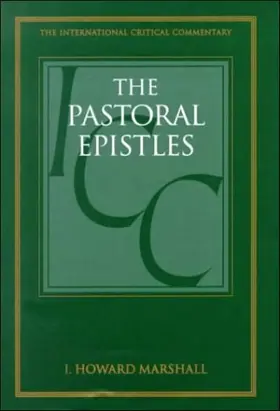

The Pastoral Epistles
in International Critical Commentary
Pages
928
Publisher
T&T Clark
Published
1/1/1999
ISBN-13
9780567086617
Collections
This book appears in the following featured collections.
- Favorite Advanced NT Commentaries by Jeremy Pierce (parableman)
- D. A. Carson's Commentary "Best Buys" by D. A. Carson
- Best Exegetical Commentaries by Jim Rosscup
- Ultimate Commentary Collection: NT Technical by John Glynn
- New Testament Advanced Commentaries by Moore Theological College Journal: Societas
- Building an NT Commentary Library by Invitation to Biblical Interpretation (Kostenberger & Patterson)
- The Pastor’s Bookshelf by Scot McKnight
- New Testament Commentaries & Monographs by Princeton Theological Seminary
- Recommended New Testament Commentaries for Evangelical Pastors by Thomas R. Schreiner
Reviews
Marshall has written numerous NT commentaries and is also an expert in Pauline theology. In this multi-volume set, Marshall places a heavy focus on historical-critical analysis and examination of the Greek text. But he does not neglect key theological conversations. He argues that Paul did not write these letters, and that a better term for this situation is “allonymity”—not false authorship, but authorship by another person. The author of these letters, according to Marshall, had no deceptive intention.
[Full Review]
Excellent commentary by the moderately evangelical, eminent British NT scholar Marshall, in collaboration with one of the top scholars on the Pastoral Epistles.
[Full Review]
An excellent volume, detailed and rigorous, Marshall’s ICC Pastoral Epistles is a running commentary on the Greek text. Perhaps the elderly Marshall’s temperament is a good match for the elderly Paul’s: Paulus senex doesn’t engage in close combat with his opponents, warning that genealogies and mythologies are endless and fruitless. Marshall senex, without ever being quite dismissive of dissenting views, sometimes makes his points so deftly and concisely that you can practically hear him grumbling “ain’t nobody got time for that.” Without bothering to offer much justification for doing so, Marshall comments on Titus first, and only then turns to Timothy (“by reading the letters in this order we shall rescue Titus from being read, as it tends to be, in the shadow of 1 Timothy and given less attention in its own right than it deserves”). I decided to structure my class the same way, and am glad I did. It meant I had to do all the detailed word studies of the pastorals’ distinctive vocabulary (eusebeia, epiphaneia, soter, paideuo, etc.) along the way to expounding Titus, which resulted in a very powerful emphasizing of the theology of Titus, especially its two golden doctrinal sections. Marshall says in the intro that he, like Towner, is traditional or conservative enough to be “more inclined to question some of the things readily taken for granted by scholars trained in less traditional schools,” and his goal in this commentary is “to find an understanding of the origin of the letters which will do justice to their closeness to Paul while recognizing the difficulties in attributing them to his pen.” The result is what I like to think of as a new, weird Paul, who is the same man as the author of the undisputed Paulines, but who has given us a whole new way of writing and thinking in these letters. Such a Paul is a gift to anyone tempted to think they’ve got Paul figured out.
[Full Review]
After commending Knight, Carson also commends Marshall and says his work is “packed with thoughtful, well-written reflection on every issue of importance.” Yet, oddly, Marshall does not believe that the epistles were written by Paul and this, not surprisingly, influences some of his interpretations. Still, it receives high recommendations and will prove valuable, especially for the teacher or preacher
[Full Review]
Marshall’s contribution is perhaps the most detailed exegetical commentary on the list, as is to be expected from an ICC volume. Marshall replaced Walter Lock’s 1924 commentary in the series. The book caused a stir when it was released since Marshall (beloved by many evangelicals) rejected Pauline authorship of these letters. The introduction to the commentary develops Marshall’s view of authorship. The body of the commentary contains detailed bibliographies for each section followed by an overview of the text. The format of the commentary is a phrase-by-phrase unpacking of the Greek text, including textual, lexical and syntactical issues. He interacts with a broad range of scholarship, with Marshall includes a number of excellent excursuses (on Household Codes, in Titus, for example).
[Full Review]
From the evangelical side, I turn to (the incredibly expensive) commentary by I. Howard Marshall
[Full Review]












